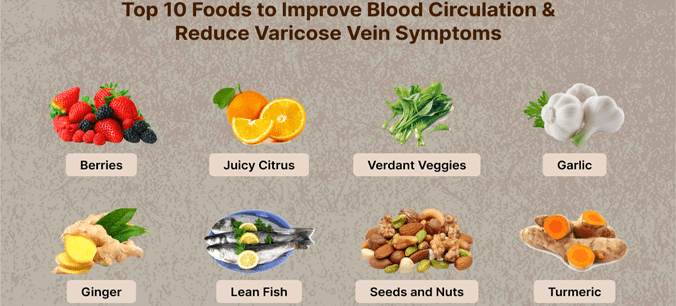Diet Tips for Managing Varicose Veins can help reduce discomfort, improve circulation, and support better vein health with simple food choices.
The right foods can reduce inflammation, boost circulation, and prevent worsening of varicose veins, making daily life more comfortable and pain-free.
Varicose veins are a common condition where veins become swollen, twisted, and enlarged, often appearing blue or dark purple.
While various treatments are available, dietary choices can play a significant role in managing symptoms and improving overall vein health.
Here’s how to eat right to help soothe your varicose veins and support vascular health:
Key Diet Tips For Managing Varicose Veins
1. High-Fiber Foods: Consuming a diet high in fiber helps prevent constipation, which can contribute to the development of varicose veins.
Straining during bowel movements puts additional pressure on the veins, worsening symptoms. Include plenty of whole grains, fruits, vegetables, and legumes in your diet.
- Examples: oatmeal, bran, apples, carrots, beans, and lentils.
2. Foods Rich in Flavonoids: Flavonoids are antioxidants that help strengthen blood vessels and improve circulation.
They can reduce inflammation and promote healthier veins.
- Examples: Berries (blueberries, strawberries), citrus fruits (oranges, lemons), onions, and dark chocolate.
3. Vitamin C and E: Both vitamins play crucial roles in collagen production and vascular health.
Vitamin C helps repair and maintain healthy blood vessels, while Vitamin E acts as an antioxidant, protecting veins from oxidative damage.
- Vitamin C Sources: citrus fruits, bell peppers, strawberries, and broccoli.
- Vitamin E Sources: nuts, seeds, spinach, and avocados.
4. Omega-3 Fatty Acids: Omega-3 fatty acids help reduce inflammation and improve blood circulation, which can alleviate symptoms of varicose veins.
- Examples: fatty fish (salmon, mackerel), flaxseeds, walnuts, and chia seeds.
5. Hydrating Foods: Staying hydrated is crucial for maintaining healthy blood flow and preventing vein-related issues.
Consuming foods with high water content can support hydration and overall vein health.
- Examples: cucumbers, watermelon, oranges, and leafy greens.
6. Potassium-rich Foods: This helps regulate fluid balance in the body, which can reduce swelling in the veins.
Adequate potassium intake supports healthy vein function.
- Examples: bananas, sweet potatoes, spinach, and avocados.
7. Foods Low in Salt: An excessive salt intake can lead to fluid retention and swelling, worsening varicose vein symptoms.
Opt for a low-sodium diet to manage and reduce these symptoms.
- Examples: fresh fruits, vegetables, and whole grains.
Additional Dietary Tips for Vein Health
- Limit processed Foods: processed and sugary foods can contribute to inflammation and weight gain, which may exacerbate varicose veins.
- Maintain a Healthy Weight: Being overweight puts extra pressure on your veins. A balanced diet combined with regular exercise can help manage weight effectively.
Consult Laserqure for Personalized Advice
Proper dietary adjustments can significantly impact your varicose vein symptoms and overall vascular health. For tailored advice and advanced treatment options, consider consulting with the specialists at Laserqure.
At Laserqure, we’re dedicated to providing comprehensive care for varicose veins and supporting your journey to better health. Reach out to us for personalized dietary recommendations and effective treatment solutions to help manage varicose veins with the right diet.

